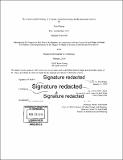The implementation strategy of virtual & augmented reality for the real estate industry
Author(s)
Huang, Kaini.
Download1102320751-MIT.pdf (9.182Mb)
Other Contributors
Massachusetts Institute of Technology. Center for Real Estate. Program in Real Estate Development.
Advisor
Andrea Marie Chegut.
Terms of use
Metadata
Show full item recordAbstract
Virtual reality and augmented reality (VR/AR) are computer-generated immersive environments that can interact with users. VR/AR have been under development for 180 years, but they have yet to be adopted by the mass-market. During the whole development process, VR/AR's adoption rates have been much lower than other general-purpose technologies at the same point in time. After the popularization failure in the 1990s, VR/AR were brought back to the public by the success of Oculus, a VR startup that was acquired by Facebook in 2014. It was followed by the exploration of various applications of VR/AR to different industries. One industry that could use VR/AR is the real estate sector, due to the needs for inventing and forecasting the appearance and quality of complex projects. The real estate industry's contribution to U.S. Gross Domestic Product was approximately 15% in 2017. A tiny improvement in efficiency may result in a large growth in this industry; therefore, it is important to study the impact that VR/AR could bring to this sector as disruptive technologies. The current status of VR/AR applications show that despite the strengths and opportunities they could bring, there are still some barriers and challenges for real estate industry adoption. To document these difficulties and strategize solutions, qualitative analyses such as market research and case studies were executed in this thesis. The adoption of VR/AR is limited to date because of the high cost of equipment, inadequate hardware, the lack of attractive content and platforms, and the absence of education. It is also limited by the specific real estate industry challenges, including unknown adoption cost, unpredictable risk, inadequate support from software suppliers, vague regulations, conservative company executives, and VR/AR's disruptive impact on organizational structures. Therefore, solutions from market, policy, and academic aspects are needed to accelerate this adoption process.
Description
Thesis: S.M. in Real Estate Development, Massachusetts Institute of Technology, Program in Real Estate Development in conjunction with the Center for Real Estate, 2019 Cataloged from PDF version of thesis. Includes bibliographical references (pages 103-106).
Date issued
2019Department
Massachusetts Institute of Technology. Center for Real Estate. Program in Real Estate Development; Massachusetts Institute of Technology. Center for Real EstatePublisher
Massachusetts Institute of Technology
Keywords
Center for Real Estate. Program in Real Estate Development.